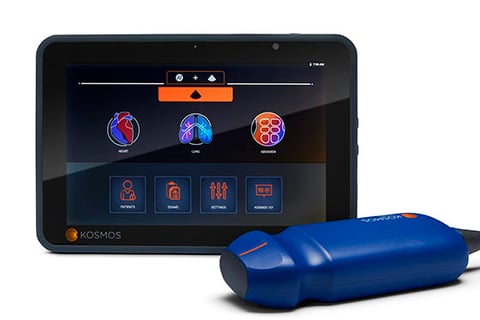AI-Powered Ultrasound Aids Diagnosis at the Bedside
By MedImaging International staff writers
Posted on 10 Aug 2021
A new point-of-care (POC) ultrasound system powered by artificial intelligence (AI) software can produce high quality diagnostic images.Posted on 10 Aug 2021
The EchoNous (Redmond, WA, USA) Kosmos system combines a lightweight, hand-held scanner called the Torso and a deep learning AI software platform. The Torso scanner is equipped with continuous-wave and pulsed-wave Doppler technology to perform ultrasound scans, and also features digital auscultation and an integrated electrocardiogram (ECG) reader, allowing it to perform stethoscope and ECG readings as well as ultrasound imaging. It also guides users through the scanning process, providing animated diagrams and automated grading and labeling to ensure they capture the highest-quality images possible.

The Kosmos Torso hand-held scanner and Bridge tablet (Photo courtesy of EchoNous)
The data collected by the Torso are analyzed by AI algorithms installed on either the user’s own Android device (with the Kosmos app downloaded), or on the Kosmos Bridge, a preloaded tablet purchased from EchoNous. The AI platform automatically computes ejection fraction, stroke volume, and cardiac output from the heart readings in a matter of seconds. Features include IPX7 rating; B-mode, M-mode, and color Doppler imaging; a Qualcomm Snapdragon 835 processor; ECG leads; a binaural headset that provides high-fidelity analog signal conditioning, digitization, and processing; and high-quality sound and visual auscultation waveform display.
“For AI techniques to be useful in POC ultrasound, a data-rich image is required to avoid classic 'garbage-in, garbage-out' problems. For deep learning to be of actual value to medicine, we have, since the beginning, carefully listened to numerous leading clinicians as to how they want AI techniques delivered with ultrasound," said Niko Pagoulatos, PhD, co-founder of EchoNous. “Torso’s added ECG abilities prevent patients in coronary care units from needing to be transferred to echo labs, saving time and money.”
The exponential growth of POC ultrasound (POCUS) in the intensive care unit (ICU) and hospital clinical wards has been driven by mounting clinical evidence showing heightened patient safety and less risk of complication when key interventions are performed with ultrasound guidance at the POC, such as imaging the abdomen, heart, and lungs, and when guiding interventional procedures, such as nerve blocks and targeted injections.
Related Links:
EchoNous














